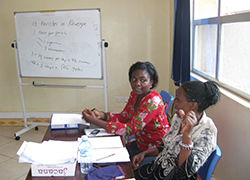Election Violence and Voting in Emerging Democracies
Researchers: Clark Gibson (UC San Diego), Karen Ferree (UC San Diego), James Long
Location: Kenya
 The international community devotes significant technical and diplomatic resources to shore up elections in new democracies, and the governments of countries afflicted by electoral violence have pursued a host of political reforms designed to reduce it. Despite these efforts, violence continues to haunt elections before, during and after the vote across the developing world.
The international community devotes significant technical and diplomatic resources to shore up elections in new democracies, and the governments of countries afflicted by electoral violence have pursued a host of political reforms designed to reduce it. Despite these efforts, violence continues to haunt elections before, during and after the vote across the developing world.
Election-related violence in countries as diverse as Egypt, Zimbabwe, Uganda, India, Pakistan, Afghanistan, Ivory Coast, Ethiopia, Colombia, and the Philippines belies intensive domestic and international efforts to improve electoral quality and highlights the fragility of democratic institutions in transitioning societies. But if elections actually increase conflict in transitioning states, election promotion in fragile, violence-prone countries undermines efforts to support political accountability.
This project seeks to bring three innovative datasets to the study of violence during elections:
- a nationwide, representative public-opinion panel survey via computer assisted telephonic (cellphones) interviews (CATI),
- information and communications technology data generated by a nationwide randomized controlled trail using cellphones which asks election observers and voters about violence on election day and expectations of violence thereafter, and
- an original data set of violent events generated from six years of articles from all three of Kenya’s national newspapers.
The study will link these novel datasets with electoral and demographic data as a proof of concept to tackle questions about the relationship between violence and elections.The study will use robust and systematic data to test the following hypotheses:
- in areas of core political support, exposure to violence should decrease participation among opposition supporters,
- in core areas, exposure to violence should increase participation among supporters of the locally dominant party,
- in swing areas, violence is likely to increase participation amongst partisans,
- in swing areas, violence may alter the vote choice of unaligned or weakly aligned voters, and
- potential voters vary in their susceptibility to violence: violence should have its largest impact on poorer and less-educated voters.

 The international community devotes significant technical and diplomatic resources to shore up elections in new democracies, and the governments of countries afflicted by electoral violence have pursued a host of political reforms designed to reduce it. Despite these efforts, violence continues to haunt elections before, during and after the vote across the developing world.
The international community devotes significant technical and diplomatic resources to shore up elections in new democracies, and the governments of countries afflicted by electoral violence have pursued a host of political reforms designed to reduce it. Despite these efforts, violence continues to haunt elections before, during and after the vote across the developing world.